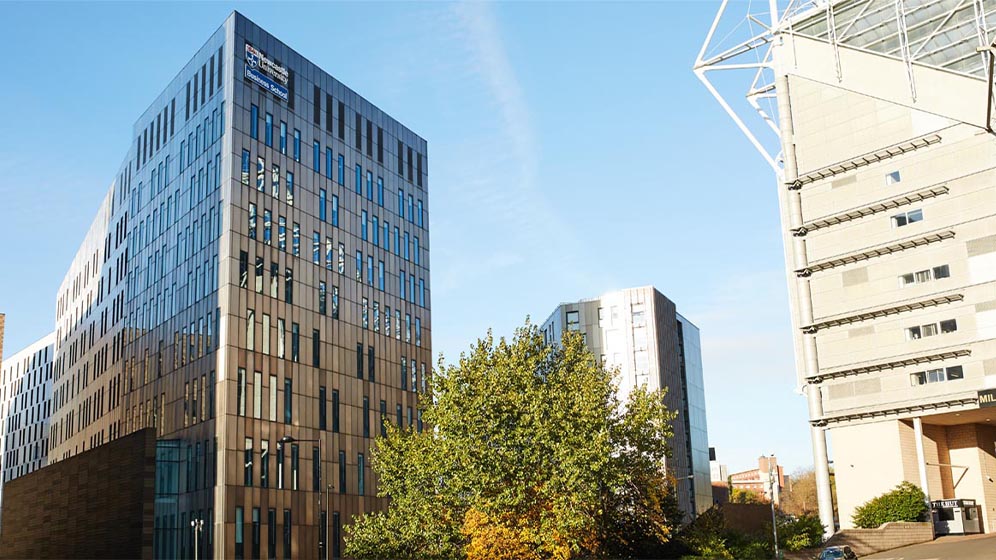Politics and Economics BA Honours
- UCAS code: LL21
- Full time
- 3 years
Develop a sophisticated understanding of the political and economic realities faced by employers in every walk of life.
You are currently viewing course information for entry year: 2026
Next start date:
- September 2026
UCAS Institution name and code:
- NEWC / N21
Course overview
This three-year Politics and Economics degree will give you the intellectual capacity to recognise, understand and anticipate the way that political and economic forces combine to shape our everyday lives.
You will study at both the School of Geography, Politics and Sociology and the Business School, tapping into their combined expertise, networks, support, careers advice and facilities, and becoming part of two flourishing student communities.
Your studies will be split 50:50 between politics and economics, with each helping to inform your understanding of the other. The course also has a strong mathematical component to help you master the unique quantitative requirements of the economic discipline.

Your course and study experience - disclaimers and terms and conditions
Please rest assured we make all reasonable efforts to provide you with the programmes, services and facilities described. However, it may be necessary to make changes due to significant disruption, for example in response to Covid-19.
View our Academic experience page, which gives information about your Newcastle University study experience for the academic year 2025-26.
See our terms and conditions and student complaints information, which gives details of circumstances that may lead to changes to programmes, modules or University services.
Quality and ranking
Professional accreditation and recognition
All professional accreditations are reviewed regularly by their professional body.
Modules and learning
Modules
The information below is intended to provide an example of what you will study.
Most degrees are divided into stages. Each stage lasts for one academic year, and you'll complete modules totalling 120 credits by the end of each stage.
Our teaching is informed by research. Course content may change periodically to reflect developments in the discipline, the requirements of external bodies and partners, and student feedback.
Featured module
ECO3021 : Economics of Risk and UncertaintyUnderstand how decisions are made in the presence of risk and uncertainty. Apply the basic theories of choice under uncertainty to financial decision-making and study the interaction of real markets and financial markets, their role in allocating risk, and how financial assets are priced.

Optional module availability
Student demand for optional modules may affect availability.
Full details of the modules on offer will be published through the Programme Regulations and Specifications ahead of each academic year. This usually happens in May.
To find out more please see our terms and conditions
Your main focus will be on core modules designed to give you a solid grounding in the principles of economics, political economic theory, data analysis, and the mathematics relevant to the discipline.
You will also choose additional modules on broad political themes such as modern political thought, or the shaping of the 21st century.
Modules
| Compulsory Modules | Credits |
|---|---|
| Analysing Economic Data | 10 |
| Mathematics for Economics | 20 |
| Economic Analysis | 30 |
| Studying Political Economy: Ideas, Theories and Skills | 20 |
You will divide your time equally between core modules on economic modelling and analysis, and modules of your choice on political topics such as the Middle East, Africa and international relations.
Modules
| Compulsory Modules | Credits |
|---|---|
| Microeconomic Analysis | 30 |
| Macroeconomic Analysis | 30 |
You will tailor your studies by choosing a combination of specialist modules: half on topics such as advanced microeconomics and the economics of banking or health; half on political subjects such as diplomacy, environmental governance, or the fall and rise of China.
You can also complete a dissertation or project based on your own original research, or contribute to a research group tackling a real-world issue on behalf of a community organisation.
Modules
You will take 60 credits from the following list:
| Optional modules | Credits |
|---|---|
| Advanced Microeconomics | 20 |
| Advanced Macroeconomics | 20 |
| Behavioural Economics and Experimental Methods | 20 |
| Monetary Economics | 10 |
| Public Economics | 20 |
| Financial Economics | 10 |
| Economics of Risk and Uncertainty | 10 |
| Health Economics | 10 |
| Industrial Economics and Policy | 20 |
| Game Theory* | 10 |
| Environmental Economics | 10 |
*If you take Advanced Microeconomics you must also take Game Theory
You will also take 60 credits from the following optional module list.
* If you take the Politics Dissertation module you aren't able to take any of the Politics Project modules. Permission to take these modules is subject to the approval of the Degree Programme Director.
+ Placement opportunities guided by policy at the time
**If you don't take the International Study Year module you may be able to take one of these modules subject to agreement of the Degree Programme Director
We base these figures and graphs on the most up-to-date information available to us. They are based on the modules chosen by our students in 2024-25.
Teaching time is made up of:
- scheduled learning and teaching activities. These are timetabled activities with a member of staff present.
- structured guided learning. These are activities developed by staff to support engagement with module learning. Students or groups of students undertake these activities without direct staff participation or supervision
Teaching and assessment
Teaching methods
You will be taught through a stimulating combination of lectures, seminars, teamwork exercises, research projects and simulations.
You will also make use of interactive online learning environments such as Blackboard and MyEconLab.
Assessment methods
You'll be assessed through a combination of:
-
Dissertation or research project
-
Essays
-
Examinations – practical or online
-
Presentations
-
Projects
-
Reflective report/journal
-
Seminar tasks/exercises
Skills and experience
Practical skills
You will be trained in R, a world-leading free statistical software that helps you to understand data, analyse trends, and make informed recommendations.
Business skills
You'll have many opportunities to boost your employability, starting with an induction week careers session dedicated to politics.
You will also be able to put your learning into practice further by conducting real-world political research for a local organisation (including Newcastle City Council) in Stage 3
Research skills
In Stage 3, you will have the chance to produce a dissertation or report based on a piece of your own independent political research.
You will be given advice on the design, methodology and implementation of this research, and can draw on your training in data analysis techniques.
Opportunities
Work placement
Get career ready with a work placement and leave as a confident professional in your field. You can apply to spend 9 to 12 months working in any organisation in the world, and receive University support from our dedicated team to secure your dream placement. Work placements take place between stages 2 and 3.
You'll gain first-hand experience of working in the sector, putting your learning into practice and developing your professional expertise.
If you choose to take a work placement, it will extend your degree by a year, and your degree title will show you have achieved the placement year. A work placement is not available if you're spending a year studying abroad. Placements are subject to availability.
Find out more about work placements
Study abroad
Experience life in another country by choosing to study abroad as part of your degree. You’ll be encouraged to embrace fun and challenging experiences, make connections with new communities and graduate as a globally aware professional, ready for your future.
Facilities and environment
Facilities
You will be part of the School of Geography, Politics and Sociology and will split your time between the newly refurbished Henry Daysh Building and the Business School.
Support
You will have one-to-one academic and pastoral support from a personal tutor and from a student.
A tutor in the department has twice won a student-nominated award for pastoral care in recent years.
Your future
You will graduate with the ability to think critically, assess complex material and data, carry out research, construct an argument and articulate it – a powerful skillset applicable to a wide range of careers.
These skills have seen our Politics and Economics graduates enjoy successful careers in politics, economics, finance, management consultancy, media, non-governmental bodies, inter-governmental organisations, human resources, marketing and business.
Some choose to pursue vocational training to become lawyers or teachers; and others undertake further postgraduate study in fields such as politics, business and finance.
Read what our graduates have to say about studying Politics at Newcastle University
Make a difference
Sorry, you need JavaScript to view this video
Careers support
Our Careers Service is one of the largest and best in the country, and we have strong links with employers. We provide an extensive range of opportunities to all students through our ncl+ initiative.
Visit our Careers Service website
Recognition of professional qualifications outside of the UK
If you’re studying an accredited degree and thinking about working in Europe after you graduate, the best place to find current information is the UK Government’s guidance on recognition of UK professional qualifications in EU member states. This official resource explains whether your profession is regulated in another country, what steps you need to take, and which organisation you should contact.
Entry requirements
All candidates are considered on an individual basis and we accept a broad range of qualifications.
The entrance requirements and offers below apply to 2026 entry.
| A-Level | |
|---|---|
| International Baccalaureate | |
|---|---|
Other UK and the Republic of Ireland qualifications
Alternative offers at Newcastle
Through one of our contextual or alternative offer routes, you could receive an offer of up to three grades lower than the typical requirements.
Contextual offers
We use certain contextual data from your UCAS form, alongside your application, to consider challenges that you may have faced in your education and the potential effect this may have had on your qualifications. This means you may be eligible to receive a lower contextual offer.
PARTNERS offers
One of the largest and longest support entry routes to university of its kind for students from underrepresented backgrounds. We support applicants from application through to study.
Realising Opportunities offers
A unique programme delivered in collaboration with 10 leading, research-intensive universities in the UK. The programme is open to students in Year 12/first year of college.
Pathways to Newcastle offers
Pathways to Newcastle, our national skills entry route, is available for specific subject areas.
High Performance Athletes
We support promising athletes at the application stage, who compete in regional, national or international levels in their sport.
Qualifications from outside the UK
English Language requirements
Entrance courses (INTO)
International Pathway courses are specialist programmes designed for international students who want to study in the UK. We provide a range of study options for international students in partnership with INTO.
These courses are specifically designed for international students who want to study in the UK and progress onto one of our undergraduate degrees. Our International Study Centre, has a range of study options including:
- International Foundation
- International Year One
- English Language courses
Find out more about International Pathway courses
Admissions policy
This policy applies to all undergraduate and postgraduate admissions at Newcastle University. It is intended to provide information about our admissions policies and procedures to applicants and potential applicants, to their advisors and family members, and to staff of the University.
University Admissions Policy and related policies and procedures
Credit transfer and Recognition of Prior Learning
Recognition of Prior Learning (RPL) can allow you to convert existing relevant university-level knowledge, skills and experience into credits towards a qualification. Find out more about the RPL policy which may apply to this course.
Tuition fees and scholarships
Tuition fees for academic year 2026-2027
The 2026 entry home fees have not yet been confirmed.
| Qualification: BA Honours | |
|---|---|
|
Home students full time 3 years |
Tuition fees (Year 1)
Not set |
|
International students full time 3 years |
Tuition fees (Year 1)
24,500 |
Year abroad and additional costs
For programmes where you can spend a year on a work placement or studying abroad, you will receive a significant fee reduction for that year.
Some of our degrees involve additional costs which are not covered by your tuition fees.
Scholarships
Find out more about:
Open days and events
You'll have a number of opportunities to meet us throughout the year at our on-campus and virtual open days.
You'll be able to:
- explore our beautiful campus
- find out about our vibrant city
- discover what students think about studying at Newcastle
You'll also have the opportunity to speak to academic staff and find out more about the subjects you're interested in.
Find out about how you can visit Newcastle in person and virtually.
We regularly travel overseas to meet with students interested in studying at Newcastle University. Visit our events calendar to find out when we're visiting your region.
How to apply
Apply through UCAS
To apply for undergraduate study at Newcastle University, you must use the online application system managed by the Universities and Colleges Admissions Service (UCAS). All UK schools and colleges, and a small number of EU and international establishments, are registered with UCAS. You will need:
- the UCAS name and institution codes for Newcastle University (NEWC/N21)
- the UCAS code for the course you want to apply for
- the UCAS 'buzzword' for your school or college
If you are applying independently, or are applying from a school or college which is not registered to manage applications, you will still use the Apply system. You will not need a buzzword.
Apply through UCASApply through an agent
International students often apply to us through an agent. Have a look at our recommended agents and get in touch with them.
Get in touch
By phone
Call us on +44 (0) 191 208 3333 and press option 1. Our opening hours are Monday to Friday 10am until 4pm.
Live chat
Our NCL chatbot might be able to give you an answer straight away. If not, it’ll direct you to someone who can help.
You'll find our NCL chatbot in the bottom right of this page.
Online
Chat to our students
Choosing a university is a big decision. If you've got questions about a particular course, student life or the city of Newcastle, why not chat to our friendly students or graduates!
Keep updated
We regularly send email updates and extra information about the University.
Receive regular updates by email








